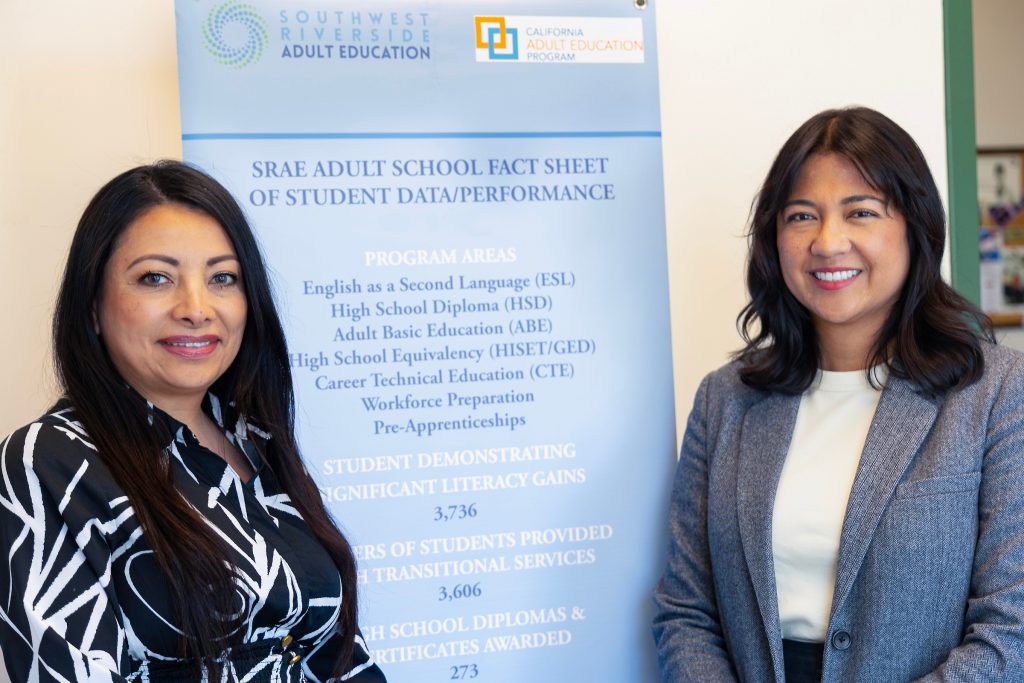Southwest Riverside consortium looks to build capacity, provide smooth transitions to careers and further education for adult learners

Since its creation a decade ago, the Southwest Riverside Adult Education (SRAE) consortium has been dedicated to building partnerships and capacity in order to best serve the roughly 7,000 students who annually enroll in its member schools.
Nohora Vazquez, the co-director of SRAE and principal of Valley Adult School in Lake Elsinore, says the consortium came about in 2015 as a result of Assembly Bill 104. The bill changed how adult education was funded in the state, and mandated the formation of the California Adult Education Program and regional consortia. SRAE was one of 71 adult education consortia established in California through this legislation.
“The Southwest Riverside consortium is composed of 10 member agencies—one community college, eight K-12 districts and one county office of education through their jail system.”
Jasmine Port, Co-director, Southwest Riverside Adult Education
“CAEP provides ongoing dedicated state funding to adult ed, with the funds being distributed to our regional consortia who determine local priorities through a collaborative planning process,” says Jasmine Port, fellow SRAE co-director and director of adult education at Mt. San Jacinto College. “The Southwest Riverside consortium is composed of 10 member agencies—one community college, eight K-12 districts and one county office of education through their jail system.”
The creation of the consortium and partnership between the various member agencies has allowed these schools to better leverage their resources for the benefit of students, Vazquez says.
“By working together we are able to make opportunities for all the students in our community,” Vazquez says. “Leveraging our resources allows us to provide students with counseling services, with workforce placement, with educational services.”
As part of these educational services, SRAE provides a wide variety of programs for students, including high school completion, English as a second language and citizenship preparation. Career technical education (CTE) and workforce preparation are also two important aspects of the consortium’s offerings.
“This regional model helps us foster those pathways throughout our region where we can coordinate our transition services, including counseling and career navigation,” Port says.
Facilitating a smoother transition between the schools, college and workforce is an important goal of the consortium, with the idea being that a student can finish one program and move to the next step in a quick and easy manner.
“These K-12 adult school agencies, they work diligently to align their programs as an onramp to potential post-secondary transitions to MSJC, as the college within our consortium,” Port says. “It is a true collaborative model.”
Building capacity and workforce development
Creating these better transition services are a big part of what the consortium refers to as building capacity, referring to an effort to better reach the goals its member schools have set in their efforts to benefit the community.
“We’ve done certain consortium-wide efforts such as really intense professional development training to better serve students in these programs,” Port says. “It’s one of the efforts we’ve initiated as a consortium to become better practitioners, to build our capacity in the classroom, as administrators and as support staff.”
Vasquez noted that building capacity has also meant expanding programs to meet the educational needs in a given area. She stressed that it was important to analyze and identify gaps where they could do better.
“By working to together we are able to make opportunities for all the students in our community. Leveraging our resources allows us to provide students with counseling services, with workforce placement, with educational services.”
Nohora Vazquez, Co-director, Southwest Riverside Adult Education
One of the consortium’s primary goals is providing students an entry way into the workforce, something they try to facilitate through local partnerships with groups like Riverside County Workforce Development.
“SRAE recognizes that strong partnerships are essential to expanding access to education and workforce opportunities for adult learners” Port says.
These partnerships are vital to connecting students to careers through training and job placement programs. The alliance also gives SRAE a better view of the region’s workforce needs, helping them develop programs and better build capacity. Strengthening these partnerships through data sharing, collaboration and regular communication is also an important goal.
“Through these efforts, SRAE is building a robust ecosystem where adult learners can transition seamlessly from education to employment, contributing to the economic vitality of the region,” Port says.
The consortium also works towards supporting reentry for incarcerated students, doing so with targeted programs like high school diploma and GED preparation. This work is often done in tandem with the Riverside County Office of Education Jail Program.
“We recognize the unique barriers these students face, and member schools have targeted programs that support reentry, skill development, and long-term career success” Port says.
Through expanding and building capacity, SRAE has managed to come a long way since its establishment, and looks to continue its growth going forward. While always looking to improve, Vazquez notes that she is proud of the work they have accomplished so far.
“We are in a good place, we feel that the team is solid and everyone is working towards common goals.”
To learn more about Southwest Riverside Adult Education and its members, visit sradulted.org.
Written by Jacob Peterson
| Regions | Classes & Topics |
|---|---|
| Southern California | English as a Second Language – High School – Variety of Classes |